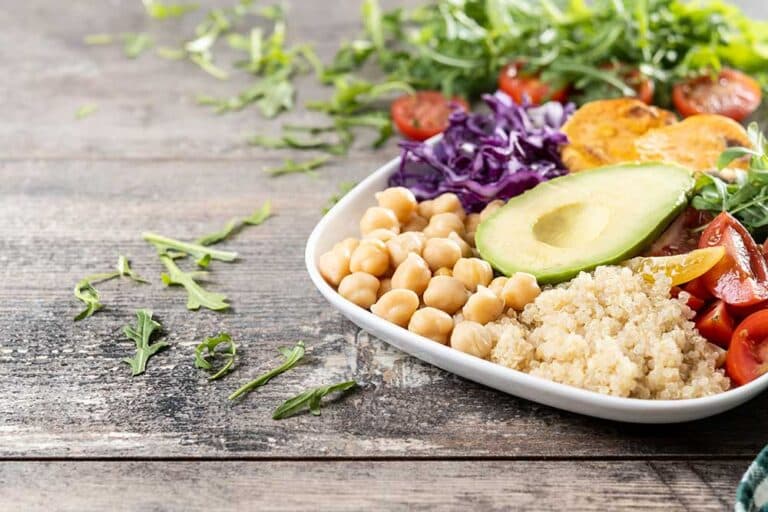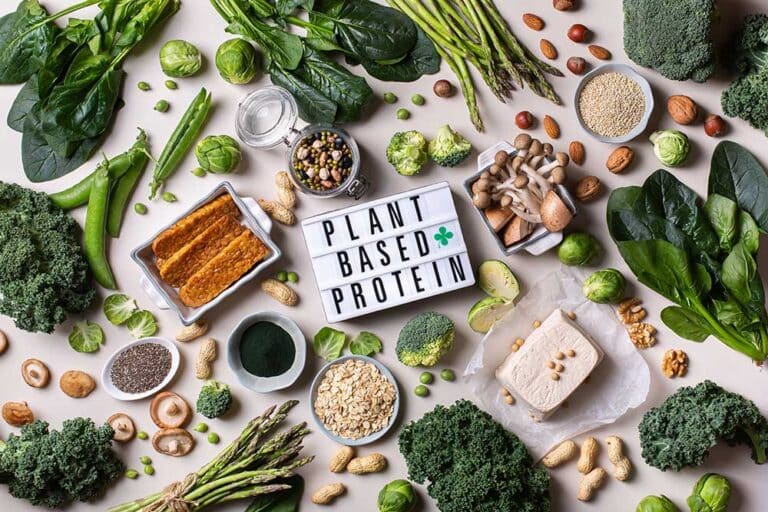Benefits of Plant-Based Eating
Health Benefits of Plant-Based Diets
Plant-based diets offer a wide array of health benefits, which make them an attractive option for those looking to improve their well-being. These diets, which include the Mediterranean diet and vegetarian diet, have been linked to reduced risks of heart disease, metabolic syndrome, diabetes, and certain cancers, such as colon, breast, and prostate cancers. Additionally, studies have shown that a vegetarian diet supports lower risks of coronary heart disease, high blood pressure, and diabetes, along with increased longevity(Harvard Health Publishing).
Individuals following plant-based diets typically exhibit lower body mass index (BMI), lower serum low-density lipoprotein (LDL) cholesterol, and lower blood pressure compared to regular meat-eaters (PubMed Central). However, it’s worth noting that vegetarians and vegans may have lower bone mineral density, which should be addressed through proper nutrient intake.
Nutrient Profile of Plant-Based Diets
Plant-based diets can provide all essential nutrients for optimal health, including proteins, fats, carbohydrates, vitamins, and minerals. Typically, these diets are higher in fiber and phytonutrients, which contribute to improved digestive health and reduced inflammation.
Generally, those on plant-based diets exhibit higher intakes of dietary fiber, carotenoids, folate, vitamin C, vitamin E, and magnesium. Conversely, they might have relatively lower intakes of protein, saturated fat, long-chain n-3 fatty acids, retinol, vitamin B12, and zinc.
| Nutrient | Plant-Based Diet | Regular Diet |
|---|---|---|
| Fiber | High | Moderate |
| Carotenoids | High | Moderate |
| Folate | High | Moderate |
| Vitamin C | High | Moderate |
| Vitamin E | High | Moderate |
| Magnesium | High | Moderate |
| Protein | Lower | High |
| Saturated Fat | Lower | High |
| Long-Chain n-3 Fatty Acids | Lower | High |
| Retinol | Lower | Moderate |
| Vitamin B12 | Lower | Moderate |
| Zinc | Lower | Moderate |
For those concerned about adequately meeting their protein needs, various plant-based protein sources are available. Explore our guide on plant-based diet protein sources and high protein plant-based foods for more information.
Individuals looking to follow a plant-based diet can find detailed advice and meal plans tailored to their needs by visiting how to start a plant-based diet and exploring plant-based diet recipes. By understanding the benefits of plant-based eating, people can make informed decisions to enhance their health and well-being.
Types of Plant-Based Diets
Mediterranean Diet
The Mediterranean diet is a well-known plant-based eating pattern that emphasizes fruits, vegetables, whole grains, nuts, and seeds. It also includes moderate consumption of dairy, poultry, and fish, while red meat is limited. According to Harvard Health Publishing, this dietary approach has been shown to reduce the risk of heart disease, metabolic syndrome, diabetes, certain cancers, depression, and frailty in older adults. Additionally, it can improve both mental and physical function.
| Nutrient Component | Food Sources | Frequency in Diet |
|---|---|---|
| Fruits and Vegetables | Oranges, tomatoes, leafy greens | Daily |
| Whole Grains | Brown rice, quinoa, whole wheat bread | Daily |
| Nuts and Seeds | Almonds, chia seeds, walnuts | Daily |
| Dairy | Yogurt, cheese | Moderate |
| Poultry and Fish | Chicken, salmon, sardines | Moderate |
| Red Meat | Beef, lamb | Limited |
Vegetarian Diet
The vegetarian diet excludes meat and fish but allows for dairy and eggs. This type of diet can be a powerful tool for promoting health and longevity. According to Harvard Health Publishing, vegetarian diets have been linked to a lower risk of coronary heart disease, high blood pressure, and diabetes. They may also increase longevity.
| Nutrient Component | Food Sources | Frequency in Diet |
|---|---|---|
| Fruits and Vegetables | Apples, spinach, carrots | Daily |
| Whole Grains | Oats, barley, whole grain pasta | Daily |
| Legumes | Lentils, beans, chickpeas | Daily |
| Dairy | Milk, cheese, yogurt | Moderate |
| Eggs | Scrambled eggs, omelets, boiled eggs | Moderate |
For more plant-based diet recipes and how to start a plant-based diet, check out our additional resources.
Vegan Diet
The vegan diet eliminates all animal products, including meat, fish, dairy, and eggs. Instead, it focuses on plant-based foods like fruits, vegetables, grains, nuts, seeds, and legumes. According to Harvard Health Publishing, vegan diets can provide all necessary nutrients for optimal health and are rich in fiber and phytonutrients. This diet is beneficial for overall health and can reduce the risk of numerous chronic diseases.
| Nutrient Component | Food Sources | Frequency in Diet |
|---|---|---|
| Fruits and Vegetables | Berries, kale, broccoli | Daily |
| Whole Grains | Quinoa, millet, whole grain bread | Daily |
| Legumes | Black beans, lentils, peanuts | Daily |
| Nuts and Seeds | Sunflower seeds, almonds, flaxseeds | Daily |
| Plant-Based Milk | Almond milk, soy milk, oat milk | Moderate |
For those concerned about protein intake, our article on high protein plant-based foods provides detailed information on how to meet nutritional needs.
Understanding the different types of plant-based diets and their components can help you decide which one is right for you. Explore our plant-based diet meal plan to get started.
Essential Nutrients in Plant-Based Diets
For those embracing the benefits of plant-based eating, understanding the essential nutrients and how to obtain them is vital for maintaining optimal health. This section covers the key sources of protein, vitamin and mineral intake, and necessary supplements for vegans.
Protein Sources
Protein is a crucial macronutrient needed for various bodily functions, including muscle repair, hormone production, and immune response. Plant-based diets offer a range of protein-rich options that can help meet the dietary needs of vegetarians and vegans.
| Protein Source | Protein Content (g per serving) |
|---|---|
| Lentils (1 cup cooked) | 18 |
| Chickpeas (1 cup cooked) | 14.5 |
| Black Beans (1 cup cooked) | 15 |
| Almonds (1/4 cup) | 8 |
| Tofu (1/2 cup) | 10 |
| Tempeh (1/2 cup) | 15 |
| Spinach (1 cup cooked) | 5 |
Besides legumes, nuts, and seeds, whole grains such as quinoa, and vegetables like spinach and peas, contribute significantly to protein intake. Vegans and vegetarians can efficiently meet or even exceed their protein requirements with a diverse plant-based diet. For further details on protein sources, refer to our section on plant-based diet protein sources.
Vitamin and Mineral Intake
Plant-based diets are naturally rich in vitamins and minerals, crucial for overall health. Vegetarians and vegans should pay particular attention to certain nutrients to ensure balanced nutritional intake.
-
Iron: Plant-based sources of iron (nonheme iron) include lentils, beans, tofu, and spinach. Consuming vitamin C-rich foods like citrus fruits can enhance iron absorption.
-
Vitamin C: Consumption often exceeds that of non-vegetarians due to higher intake of fruits and vegetables, which aid in iron absorption.
-
Calcium: Found in fortified plant milks, leafy greens like kale and bok choy, almonds, and tahini.
-
Omega-3 Fatty Acids: Sources include flaxseeds, chia seeds, hemp seeds, and walnuts.
Plant-based diets can provide all necessary nutrients for optimal health, including protein, fats, carbohydrates, vitamins, and minerals (Harvard Health Publishing). For a detailed nutrient plan, check out our plant-based diet meal plan.
Supplements for Vegans
Vegans may occasionally need supplements to meet their nutritional needs fully. The most notable supplement for those on a vegan diet is vitamin B12, which is not naturally found in plant-based foods.
-
Vitamin B12: Important for nerve function and red blood cell production. Vegans should consider taking a B12 supplement or consuming fortified foods.
-
Vitamin D: Essential for bone health, and can be obtained from fortified foods or supplements, especially in regions with limited sun exposure.
-
Omega-3 Fatty Acids: While plant sources are available, some vegans may opt for algae-based supplements to ensure adequate intake.
For more information on supplements, visit our plant-based diet for beginners section to start your journey towards a healthier lifestyle.
Following a plant-based diet with a well-rounded approach to essential nutrients can unlock numerous health benefits. Keep exploring and adapting to find what works best for your body and well-being. For more insights, check out our article on benefits of plant-based eating.
Plant-Based Diet and Disease Prevention
Exploring the relationship between plant-based diets and disease prevention reveals numerous health benefits. Individuals who follow plant-based eating habits often enjoy a reduced risk of several chronic diseases.
Heart Disease and Metabolic Syndrome
A plant-based diet is linked to a decreased risk of heart disease and metabolic syndrome. The Mediterranean diet and vegetarian diet are particularly effective. Studies have shown that these diets support heart health and reduce the risk of coronary heart disease, high blood pressure, and stroke (Harvard Health Publishing).
The fiber content in plant-based foods helps to lower cholesterol levels, while the antioxidants present in fruits and vegetables protect the arteries from inflammation and damage. Additionally, nonheme iron found in plants is not associated with heart disease, unlike the heme iron in meat products.
Cancer Prevention
Adopting a plant-based diet can also significantly reduce the risk of various cancers. High fiber intake from plant sources supports digestive health and helps maintain a healthy weight, which is crucial for cancer prevention. Plant-based foods are rich in antioxidants, which protect cells from damage and reduce inflammation (MD Anderson).
Research indicates that these diets can lower the risk of colon, breast, and prostate cancers. This protective effect is attributed to the immune-boosting properties of plant-based diets and their ability to maintain overall health.
| Cancer Type | Reduced Risk (%) |
|---|---|
| Colon Cancer | 30 |
| Breast Cancer | 20 |
| Prostate Cancer | 15 |
Diabetes Management
For those managing or looking to prevent diabetes, a plant-based diet offers considerable advantages. The high fiber content of plant-based foods slows digestion and stabilizes blood sugar levels. This is particularly beneficial for individuals at risk of or living with diabetes.
Plant-based diets have been shown to reduce the risk of metabolic syndrome, a cluster of conditions that increase the risk of diabetes. These conditions include high blood pressure, elevated insulin levels, and abdominal obesity. By adopting a plant-based diet, individuals can better manage their blood glucose levels and reduce their dependency on medication.
For more information on dietary adjustments for diabetes, visit our article on plant-based diet for beginners.
By understanding the multitude of benefits associated with plant-based diets, individuals can make informed choices to enhance their health and well-being. Further information on the benefits of plant-based eating can be explored through our plant-based diet benefits section.
Plant-Based Diet for Weight Management
A plant-based diet can play a pivotal role in weight management. This section delves into how plant-based eating aids in weight loss, its impact on BMI, and the various weight-related benefits it offers.
Role in Weight Loss
Plant-based diets can be instrumental in shedding excess pounds. By swapping a meat-heavy diet for a plant-centric one, individuals can decrease their risk of obesity and foster weight loss. Research indicates that those who adopt a plant-based approach tend to weigh less compared to their meat-eating counterparts. This difference is often attributed to the lower caloric density and higher fiber content of plant foods, which promote satiety and reduce overall calorie intake.
Impact on BMI
The body mass index (BMI) serves as a key metric for assessing healthy weight. Studies show that individuals following a plant-based diet typically have lower BMI values compared to those consuming animal products. The table below illustrates the average BMI values among different dietary groups:
| Dietary Group | Average BMI |
|---|---|
| Meat Eaters | 28.8 |
| Vegetarians | 25.7 |
| Vegans | 23.6 |
Choosing a plant-based diet can significantly lower BMI, fostering better weight management and reducing the likelihood of obesity-related health issues. For a comprehensive guide on how to start a plant-based diet, visit how to start a plant-based diet.
Weight-Related Benefits
Maintaining a healthy weight through a plant-based diet presents numerous advantages. Among these are reduced inflammation, improved gut health, and a decreased risk of chronic diseases:
- Reduced Inflammation: Plant-based diets are rich in essential nutrients that neutralize toxins and free radicals, effectively reducing inflammation in the body.
- Improved Gut Health: High-fiber plant foods aid in better digestion, nutrient absorption, and bowel management, while also lowering cholesterol and stabilizing blood sugar levels (MD Anderson).
- Cancer Prevention: By maintaining a healthy weight, the risk of various cancers, such as colorectal, breast, uterine, esophageal, kidney, and pancreatic cancers, is substantially reduced.
For more details on plant-based diet advantages, explore plant-based diet benefits. Additionally, check out our articles on plant-based diet for beginners and plant-based diet and weight loss for more information on how this lifestyle can support optimal health and weight management.
By adopting a plant-based diet, you can not only improve your BMI and weight profile but also enjoy multiple health benefits associated with consuming nutrient-dense, low-calorie foods.
Environmental Impact of Plant-Based Eating
In addition to its numerous health benefits, a plant-based diet offers significant advantages for the environment. This section explores how such a diet can contribute to sustainability through greenhouse gas reduction, water conservation, and land use efficiency.
Greenhouse Gas Reduction
Animal agriculture is a leading contributor to greenhouse gas emissions, responsible for 18% of global emissions, which is more than all transportation emissions combined. Switching to a plant-based diet can drastically lower one’s carbon footprint.
| Product | Greenhouse Gas Emissions (kg CO2 equivalent per kg food) |
|---|---|
| Beef | 27 |
| Cheese | 13.5 |
| Poultry | 6.9 |
| Vegetables | 2 |
Meat and dairy products generate significantly more greenhouse gases than plant-based foods. For instance, a vegan diet can help reduce carbon dioxide emissions by 50%. For more details on how plant-based diets contribute to environmental sustainability, visit our article on plant-based diet benefits.
Water Conservation
Shifting towards plant-based diets can also lead to substantial water savings. Producing one pound of beef requires 1,847 gallons of water, whereas producing the same amount of vegetables only requires 39 gallons (CleanChoiceEnergy). Animal agriculture consumes 55% of water in the U.S., compared to just 5% for private homes.
| Product | Water Usage (gallons per pound) |
|---|---|
| Beef | 1,847 |
| Pork | 718 |
| Chicken | 518 |
| Vegetables | 39 |
Nationally adopting plant-based diets in the U.S. could save up to one million liters of water per person per year. For more on how to integrate these practices into daily life, check our page on plant-based diet meal plans.
Land Use Efficiency
Animal agriculture is a significant driver of deforestation, particularly in the Amazon, where over 80% of deforestation is attributed to cattle ranching (CleanChoiceEnergy). Meat and dairy products use 83% of the world’s farmland while providing only 18% of global calories, making them highly inefficient food sources.
| Food Type | Land Use (m² per kg food) | Caloric Contribution (%) |
|---|---|---|
| Meat & Dairy | High | 18% |
| Plant-Based Foods | Low | 82% |
Adopting a plant-based diet can lead to more efficient land use, conserving millions of acres of land. Visit how to start a plant-based diet for guidelines on making this transition.
By understanding the environmental impact of dietary choices, individuals can make informed decisions that benefit both their health and the planet. For more information on high-protein options within plant-based diets, see our article on high protein plant-based foods.
- About the Author
- Latest Posts
Johnnie D. Jackow Sr., the founder and CEO of Total Body Fitness, Worldwide, has a long-standing career in the fitness industry. He began as a certified personal trainer in the mid-90s and soon after authored his first weight loss book in 1998. This led to the launch of Total Body Fitness, Nationwide in the USA at the same time. Johnnie gained recognition as the fitness guru of his time, running infomercials on local TV late at night in Houston, Texas. Over the years, he has helped more than 40,000 individuals from all over the world achieve their health and fitness goals. With over 60,000 hours of documented training in integrative functional medicine, he completed his PhD in human physiology in 2010. His primary objective is to assist people in reaching their health and fitness goals through alternative approaches rather than relying solely on conventional medicine and pharmaceutical drugs. Today, with almost three decades of experience under his belt, Johnnie continues to be a leader in health and fitness.








